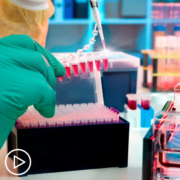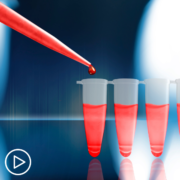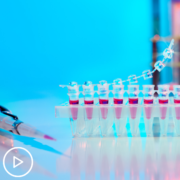Why Do Lung Cancer Patients Need Molecular Testing Before Choosing Treatment?
Why Do Lung Cancer Patients Need Molecular Testing Before Choosing Treatment? from Patient Empowerment Network on Vimeo.
How do a patient’s genetic mutations impact lung cancer treatment? Lung cancer specialist Dr. Estelamari Rodriguez emphasizes the importance of undergoing biomarker testing, also referred to as molecular testing, to identify genetic mutations, which may lead to a more personalized lung cancer therapy.
Dr. Estelamari Rodriguez is Associate Director of Community Outreach – Thoracic Oncology at the Sylvester Comprehensive Cancer Center, University of Miami Health System. Learn more about Dr. Rodriguez, here.
See More From INSIST! Lung Cancer
Related Resources:
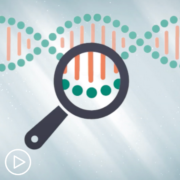
|

|
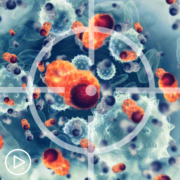
|
Transcript:
Katherine Banwell:
What is molecular testing?
Dr. Estelamari Rodriguez:
So, that is very critical for lung cancer patients today. So, molecular testing is when we get tumor cells, and we analyze the genetic changes that lead to that tumor growth. And that can be done today in different ways. The usual goal standard have been to do a biopsy of the tumor, and then do next generation sequencing when we analyze many, many genes that can impact cancer growth, and then we get a signature what drives that cancer. And in doing that, we discovered that some patients, for example, regardless of who they are, women or men, smokes or non-smokers, they may have a genetic driver that we have a treatment for, that does better than chemotherapy.
So, that is important that you identify that as early as possible.
Katherine Banwell:
Why is it necessary for patients to undergo molecular testing prior to a lung cancer treatment plan?
Dr. Estelamari Rodriguez:
So, it is extremely critical because we have data today that several of these targeted treatments, the improvement of survival is not in the span of months, it’s in the span of years.
People will do years better if they started with the treatment for their specific cancer driver mutation than if they received chemotherapy.
We also saw that when immunotherapy came in the market a lot of patients, rightly so, doctors thought, “This is the best new thing, let’s put this patient on immunotherapy” and they were not testing patients for mutations before they started. And we found out two things, one is that there is toxicity if you give immunotherapy followed by some of the targeted therapies, specifically one called osimertinib (Tagrisso), so that you could cause harm.
And then, number two, that immunotherapy doesn’t work in every case. A lot of patients with targeted driver mutations, they do better with a targeted treatment than they will do with chemotherapy and immunotherapy. So, I think it is important to define that early. We also now have approval for at least one targeted therapy after surgery.
So, even patients that are early stage, which is not the majority of patients, but those patients also will get an improvement if they have an EGFR mutation specifically if they receive that targeted pill treatment after surgery. So, understanding the tumor is important so you can select the right treatment for the patient.
Now, this is a dynamic thing, so tumors can evolve over time. So, there are many times that patients come to us for second opinions, and we actually recommend a repeat biopsy to understand the new genetic signature of that tumor because we may find a new option that was not there at the beginning.

